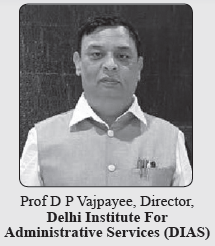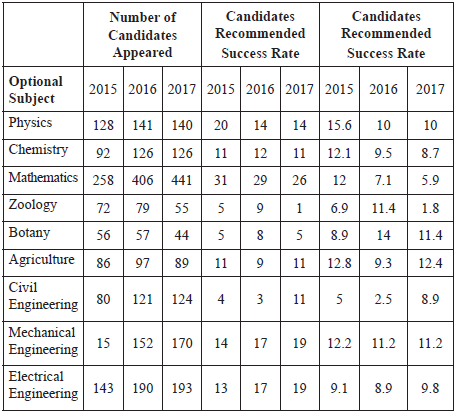Science Optionals Strategy - By prof. D.P. Vajpayee, Director DIAS

How to choose right optional?
In my opinion, optional should be chosen on the basis of:
- Interest in that subject,
- Scoring pattern of the subject in last two –three years,
- Availability of study material, and
- Expert guidance.
- First advice to choose optional is that one must have keen interest/ strong liking for the subject. It generates a level of confidence in one’s abilities and it helps displace more than 80 per cent of peers.
- Remember, any competition is survival of the fittest. It is an elimination of eighty per cent of peers. Therefore, it should, preferably be the subject studied during Graduation/Post-Graduation.
- There is no hard and fast rule in this regard, but my advice to aspirants in last twenty years has been that choosing “parent subject” as their optional proves beneficial, until and unless there are some very genuine points against that subject.
Students with Science/Engineering Background
For M.Sc background candidates, irrespective of their success in this exam, it is the best subject and must be opted; otherwise they are at loss.
- B.Sc background candidates, depending on their continued interest may or may not opt, but M.Sc candidates do not have much choice because first they are most prepared in the subject and secondly, this is the subject of their first love and they will be at a great loss if they do not opt for it as it will be their alternate and glowing career choice.
- On the basis of interest, it has been first preference of many bright engineering graduates and every year in my classes, I have more than 70 per cent candidates coming from various engineering graduates (more than half of them are IIT graduates).
- A large number of engineering graduates appear with Physics, therefore large numbers are selected and thus creating a wrong perception of subject being taken only by IITians. Subject is most suited for M.Sc/B.Sc background candidates followed by engineering graduates.
Patterns
- Second criterion is scoring pattern of the subject. Although I consider every optional is equally scoring, then what do I mean by this term? This means every subject in CSE is not evergreen, UPSC follows some pattern. Some subjects are on up trajectory for some period. This pattern is followed in case of popular subjects, which almost all are humanities subjects. But, here, Science optionals - Physics/ Mathematics/Chemistry /Life Sciences/ Engg. Optional, etc. stand tall and have advantage, as they are not very common optionals, only a handful opts for them. Therefore, all science optionals are evergreen subjects.
- Every year some 20 per cent people qualify for personality test with any Science optional and thus Physics/Mathematics or Chemistry for that matter is as good an optional as anything else.
Study Material and Guidance
- Next criterion is availability of study material and expert guidance. Syllabus of Science optionals are static in nature i.e. syllabus is fixed and plenty of books are available. List of books are well known and can be easily ascertained by google search.
- One more advantage of science optional is their objective orientation. Evaluation is independent of frame of reference. Whether paper is evaluated by X examiner or Y examiner, if answer is correct, marks are to be awarded.
Is Coaching Essential?
Any subject can be well prepared by self-study. In fact there is no substitute for self-study.
- Competitions are passed by intrinsic level of candidates. Neither books nor teachers can create a topper. If one possesses those innate skills/traits a good mentor/guide or coach can hone them up. A good teacher can make your path less hurdle some, but cannot provide the drive.
- If one has a passion, energy and drive to succeed, then only one can succeed. In fact, in every successive batch, I have been repeating that competitions are always cleared by students’ own abilities; I only get credit for their success because I am still able to attract best students of the country.
- Not everyone clears from any classes. For a best batch of a 50 students, at the most 20 per cent can succeed, that I know from day one. Then why do people think coaching is essential? Answer is in between.
- For example, I have been teaching over a long period of time and have evaluated answer sheets of more than 5000 excellent candidates, so by my sheer experience I know what UPSC desires in a candidate and what kind of answer is expected.
- So, if someone joins or interacts with a person like me lot of time and energy can be saved. Syllabus of any optional is equivalent to that of a four year degree course, which in our case turns out to be higher than that of ‘Honours’ level and little less than that of ‘Masters’ level.
- Only an experienced hand can do justice to such a vast syllabus in a short duration of 4 to 5 months.
- If one is ready to work hard and practice, everything can be surmounted. More harm can be done by choosing a wrong coach than self-study. I consider self-study to be a better option than going to many coaching institutes, which are nothing but businesses ready to fleet you.
How to select Good Mentor/Coaching?
The current scenario is replete of coaching institutes offering all kind of guidance with big promotions and fake results in media/ social media.
- First of all, I consider, coaching is not essential at all. One can prepare on its own. But on the other hand, guidance from expert helps in giving some extra edge and may help in framing right way of answering a question and save time and energy of preparation. But institute or coach should be selected very carefully otherwise more damage can be caused.
- One may select a right mentor/coach by talking to a cross section of selected candidates or from the feedback of known persons, instead of blindly aping the others and go by advertisements.
Relative Performance of Science Optionals in Cse in last Three Years
The relative performance of different Science optionals in last three Civil Services Examinations as per latest 69th Annual UPSC Report is given below to help you decide about the optionals.
- Remember ten per cent plus success rate is regarded as excellent in CSE. Most popular among Science optionals, Mathematics has success rate of 7.1 and 5.9 per cent respectively in CSE 2016 and 2017. Most popular humanities optional have success rates between 5 to 8 per cents. Therefore popularity of the optional does not mean high success rate.
- In terms of number of selections, definitely popular optional will have an edge. If a subject has 4000 candidates appearing, even success rate of 4 per cent will also be equal to 160 selections. But, matter of fact is that for every selection there is a rejection of 96. However limitation of this analysis is due to time lag of 2 years in obtaining authentic data.
- Another limitation of analysis is that UPSC provides only number of candidates finally selected, not the data of candidates passing Mains. If we take factor of 2.5 for success in personality test, then success rate of optional will be 2.5 times number of candidates finally recommended.
- For Physics optional, which I know for sure every year out of approximately 140 to 150 candidates appearing in Mains, about 30 to 35 candidates get a call for Personality test. Therefore I regard it as a best subject with consistent success rate and an ever green optional.
- But if we analyse carefully from the table, most of the science/engineering optional have a double digit success rate, and in true sense four out of one selections. Though they may require little more time to master the desired level of excellence, but effort is best rewarded.
- Science optionals by their very nature are objective, so even after normalisation, are more scoring. If one is in top ten per cent of the class, 300 plus marks are assured, which can easily catapult to one’s dream career.

Expert Advice
- 1 Agriculture An Optional One Can Rely Upon - By S. A. Hussain, Career Care, Kolkata
- 2 Anthropology Optional Strategy - By N.K. Vaid Sir Vaid’s ICS Delhi
- 3 Physics Optional Strategy - By prof. D.P. Vajpayee, Director DIAS
- 4 Philosophy Optional Strategy - By Dharmendra Sir Director Patanjali IAS
- 5 Law Optional Strategy - By Alok Kumar Ranjan, Head master, Ambitions Law Institute
- 6 Geography Optional Strategy - By Chandan Priya, Director, Perfections IAS
- 7 Public Administration Optional Strategy - By Sunil Gupta, Director, Inspirations IAS Academy
- 8 Psychology Optional Strategy - By Dr. Neha R. Jain, Founder, Psychology with ease
- 9 Science They Are Evergreen Safely Optionals- By prof. D.P. Vajpayee, Director DIAS

